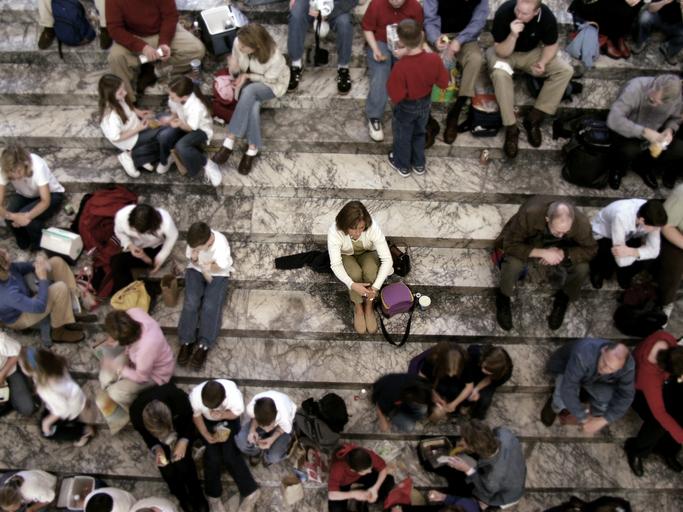
Why More Students Feel Lonely as Days Grow Shorter – and How to Break the Cycle
Feeling lonely at university can be overwhelming. With the clocks going back and the days getting shorter, online searches for Seasonal Affective Disorder (SAD) have reached a high.
Ria and Sarah speak to Dr Dominique Thompson, a GP and young people’s mental health expert, all about loneliness and Seasonal Affective Disorder. Dr Thompson sits on committees such as the National Government Taskforce for Student Mental Health and is the President of the Student Mental Health Association.
Ria and Sarah: “First things first, how would you define loneliness?”
Dr Dominique Thompson: “The thing about loneliness is even when you’re surrounded by other people, you can feel disconnected from them. Maybe it makes you feel vulnerable, you might feel a bit anxious about it and somehow less safe. It’s not the same as social isolation which is a physical thing. Some people that are socially isolated are actually quite happy to be so, we mustn’t get the two mixed up.”
“I often say to students, you can be lonely in a crowded place like a university.”
Ria and Sarah: “Statistics show that in a mental health survey conducted by Cybil in 2023, 39% of students say they experienced a decline in their mental health when they went to university.”
“And 1 in 5 students say they have no friends at university.”
“Do you think this is something that is contained within the student population or do you think this reflects a wider societal issue?”
Dr Dominique Thompson: “Unfortunately, it isn’t just students. There is an issue with increasing loneliness everywhere I go. It’s the age groups between 16-30 that feel most lonely. We often think of it being a problem of the older generation but young people feel the pain of loneliness more.”
Ria and Sarah: “Why as a society do you think we’re becoming more lonely?”
Dr Dominique Thompson: “A lot of the thinking is that it has gotten worse since Covid. When we had to isolate ourselves, we lost some of that ability to connect with others. Some people never built the skills to make new friends and meet new people. We got used to sitting on our sofa, watching TV.”
“Humans need other humans. We need them to stay well and function.”
Ria and Sarah: “Yesterday I noticed it was dark by 5 pm and I started to feel this sense of dread and nervousness. You’ve done a lot of work on Seasonal Affective Disorder (SAD). Can you explain what SAD is, the symptoms of it and how it impacts loneliness?”
Dr Dominique Thompson: “The key thing here is two things go on at this time of year that are common for students to be wrestling with. One is loneliness and for a small sub-group of people, they get a type of depression. They feel down, they are particularly affected by the seasons. They tend to want to sleep more and eat more carbohydrates. It’s a sort of hibernation and a basic reaction to that changing temperature.”
“It’s a really difficult time for some people.”
“SAD can make loneliness worse and loneliness can make SAD worse. It’s a vicious cycle.”
Ria and Sarah: “Is it common for students to feel this way?”
Dr Dominique Thompson: “It is common for students. This time of year people have come back from lots of different places, it can be a time of transition where you feel a bit like your world is moving around you and you haven’t settled yet.”
“I saw a lot of students as a GP who would come in and they’d say that they had no friends.”
Ria and Sarah: “What do you think are the first steps to combat SAD?”
Dr Dominique Thompson: “We need daylight. We need to make sure that we get outside when it’s bright. If you are working, make sure you work by a window.”
“It’s important to stay active. We need to fight hibernation. Whilst it’s fine by the end of the day to stay on your sofa, try and get outside and do some exercise.”
“Some people find that getting a special light and putting it on their desk is helpful. This is well-proven and backed up by science. You need to get a ‘SAD Light’ and see what works for you.”
“You need a healthy sleep routine. Try not to sleep during the day and make sure you’re getting up at the same time every day. Keep your body in a nice routine.”
“Not too much comfort food. I know we all crave carbs but be careful!”
“If you’ve tried these things and it’s still a struggle, ask for help and talk to a professional. Don’t struggle alone. There are people out there working in your university and if you’re not sure where to look, go to the university website and type in ‘student support’.”
Ria and Sarah: “A lot of parents think that social media and technology are one of the biggest perpetrators of isolation. Do you agree with this? And is there any way that technology can be used to combat loneliness instead?”
Dr Dominique Thompson: “I am definitely not in that parental camp and I have a teenager. Clearly, there are huge benefits to connecting with others through technology and I have no issue at all if you have a positive, healthy connection with others. You’ll know because you’ll feel happy when they’ve sent you a message or made you laugh.”
“Sometimes it’s those friendly connections with friends, peers and family Whatsapp groups. And sometimes we need the technology because we want to message someone for help. There are fantastic free resources like ‘Shout 85258’ that anyone can message.”
Words By: Ria Sharma

